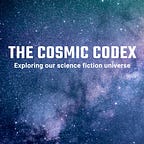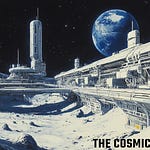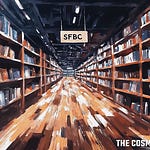Science fiction has changed over the last forty years. When I was growing up, the bulk of the sf in magazines and on bookstore shelves was from the United States and the United Kingdom. Today, it’s not uncommon for genre magazines to carry science fiction and fantasy from Chinese and, I’m learning, Indian authors.
The latter is the case with “Floating on the Stream that Brings from the Fount”, by Prashanth Srivasta, the cover story of the January/February issue of The Magazine of Fantasy and Science Fiction.
F&SF describes Srivasta’s story as “…a tale that brings together his endless fascination for both space opera and the Mahabharata.”
For those (like me) unfamiliar with the Mahabharata, it “…is one of the two major Sanskrit epics of ancient India in Hinduism…It narrates the struggle between two groups of cousins in the Kurukshetra War…”
Out of these two disparate sources, Srivasta crafts an engaging narrative about a crew of misfits and their bucket-of-bolts starship. They are, not surprisingly, running a secret mission for “the Empire”. This involves seeking a MacGuffin—one which doesn’t seem to make sense until you look deeper into what the author is saying about the nature of empire.
I appreciated what Srivasta brought to the story from his Indian culture and his references to an unfamiliar (to me) scripture. At the same time, there were moments where I felt I was struggling with certain turns of phrase. This made the piece a bit more difficult to read than I had expected.
The story opens in an ocean-side dock district on Panchal-Twenty-four, where Imperial Captain Draupadi of the starship Marammat can smell not only the scent of the sea but also that of “ink and parchment”. This is our first clue as to the strange quest on which she will soon find herself.
For a Westerner interested in sf from foreign cultures, Srivasta delivers fully. Besides delightfully unfamiliar (again, to me) names such as “Draupadi”, “Dorje”, and “Dharmendar”, men’s beards abound here. The Marammat’s pilot wears a beard extending to his waist. At one point, the characters eat a meal of pomegranate aril, rice, and dal—two of which I had to look up. Polytheism is the norm. The Mahabharata, of course, ends up playing an important role.
The Empire to which Draupadi technically owes allegiance is a fairly standard interstellar superstate. Refreshingly, however, this one is ruled by an empress, rather than the conventional emperor. The Empire requires a large fleet of starships to hold its many worlds together. The fleet also enables the expansion on which the Empire’s prosperity depends. The starships are driven by a fuel produced by the mysterious “Engine”. To bad it’s a rather cantankerous piece of machinery. It fails to produce the fuel critical to the Empire’s survival unless it is fed a steady stream of...stories. That’s right—just like Scheherazade in One Thousand and One Nights, the Empire must offer up “…completed, satisfying—and, most importantly, unique—fiction…” to the Engine’s mechanical Shahryār. No new tales, no fuel. No fuel and the fleet doesn’t move. If the fleet doesn’t move, the Empire dies.
If you’re finding it hard to suspend your disbelief in the face of this “stories for fuel” arrangement, I’m right there with you. But it’s both a plot device and a metaphor. Srivasta’s theme seems to be that empires thrive on stories. When you consider how important Homer’s Iliad and Odyssey were to the Athenian Empire, the significance Virgil gave them when creating his Aeneid to fulfill a similar role for the Roman Empire, or even the extent to which Americans rely on stories about the Founding Fathers, it’s hard to argue with him. The tales a people believe about themselves are the burning heart of any vigorous empire, serving to justify the sacrifices empire demands. Srivasta literalizes this metaphor, creating an empire that depends for its very existence on an endless stream of original stories to keep its ships moving between the stars.
To meet the insatiable desire of the Engine, the powers-that-be have moved to the mass-production of fiction. Unnumbered writers labor away producing new narratives to be fed to the machine. This is the reason for all that parchment and ink near the docks on Panchal-Twenty-four, where authors congregate in “writer houses” to serve their Empress.
As we well know, mass production sacrifices quality. Less and less of the tripe the writers turn out is suitable for feeding to the Engine. If current trends continue, the Empire will run out of fuel in a year.
Salvation comes in the form of reports that an old “Earth Library” has been found—an archive with “millions of stories”. This is enough to keep the Engine cranking out large amounts of fuel for “several lifetimes”.
Enter our cast of characters. My favorite, other than Draupadi, is Abilkiss. He’s an “Imperial handyman”—a title (not to mention an accompanying job description) worthy of Cordwainer Smith. Other supporting characters include Draupadi’s friend Gyani, the Marammat’s pilot Dorje, and Taavaran, an “Imperial literature specialist” who’s along to confirm the stories in the Library are of sufficient quality to satisfy the Engine.
Some characters are struggling against the Empire, having been pressured into the quest. But one important team member faces an internal challenge. Who it is, and the exact nature of the conflict, provide an ongoing thread of mystery and tension.
These companions aren’t all on the same page regarding how they feel about the Empire, or exactly why they’re searching for the Library. When they find it, along with its Librarian, neither is exactly what they expect.
My only significant criticism of this story may be the flip-side of my love for its Indian foundation. Many times I ran across expressions that didn’t really make sense to me: “From the Empress’s silver toilet”, “A time that now shook against its pivot in a clock that had run out of batteries”, “They stared at where she had stood, as if her fragrance must hold answers her tongue couldn’t release.”
Are these figures of speech in Hindi or some other Indian language other than English? Colloquialisms from where Srivasta grew up? Expressions unique to the author? My confusion definitely stems from my ignorance, but it none-the-less interfered with the flow of my reading.
Overall, I very much enjoyed this story. It’s an entertaining space opera firmly rooted in a culture very different from my own. As a bonus, it has something genuinely thoughtful to say about empires and how they function.
Recommendation: Read it!
Please share your thoughts about this article by commenting online at thecosmiccodex.com!











